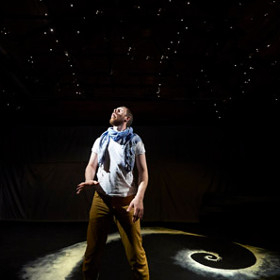Moon Project

Moon Project was born after its writer, Rachel Blackman, watched the documentary film In The Shadow Of The Moon, which recounts the stories of the Apollo mission astronauts who walked on the moon and returned to Earth.
There are no astronauts in this two-hander; the connection with the documentary is not quite so literal. Instead, Blackman has constructed a stylised, stripped-back piece which considers how an event can impact upon the lives of those who share it.
The show is structured around a talk being given by two unlikely friends: highly-strung aeronautical engineer Leila (Rachel Blackman), and film-maker Shahab (Jules Munns). The action moves between the talk and flashbacks to pivotal moments in the development of their friendship.
The chain of events begins when Shahab, distracted by a girlfriend’s refusal to move in with him, crashes his car into Leila who is cycling to work. Leila is thrown into the air; Shahab does not stop. He returns to the scene later, however, and is haunted by the fact there is no sign of the earlier incident other than a necklace lost by Leila. Shahab tracks Leila down in hospital, lying in a coma, and starts to visit her regularly. In doing so, he realises he’s stuck and resolves to escape. After she recovers, their paths cross again by chance in Waitrose. She feels she recognises his voice and follows him home. That night the molecules of their story begin to form into friendship…
Moon Project has more physicality than a regular play, a smattering of humour, and some haunting visual sequences including representations of the crash and what it might be like to experience a coma. The design is simple, with only a table and chairs on stage and some atmospheric lighting. The two performances are committed and charismatic. The whole thing may be a little ‘out there’ for some, but go with an open mind and it should make you think.
The piece takes a while to come together and reveal its underlying message, but does so satisfyingly in the end. A voiceover quote (a little research suggests it’s from American astrophysicist Neil deGrasse Tyson) sums it up neatly: the atoms that make up the human body are traceable to stars which collapsed, exploded, scattered their guts across the galaxy and formed solar systems with planets that possess the ingredients for life. In essence: chance events made us, and continue to make us what we are.










